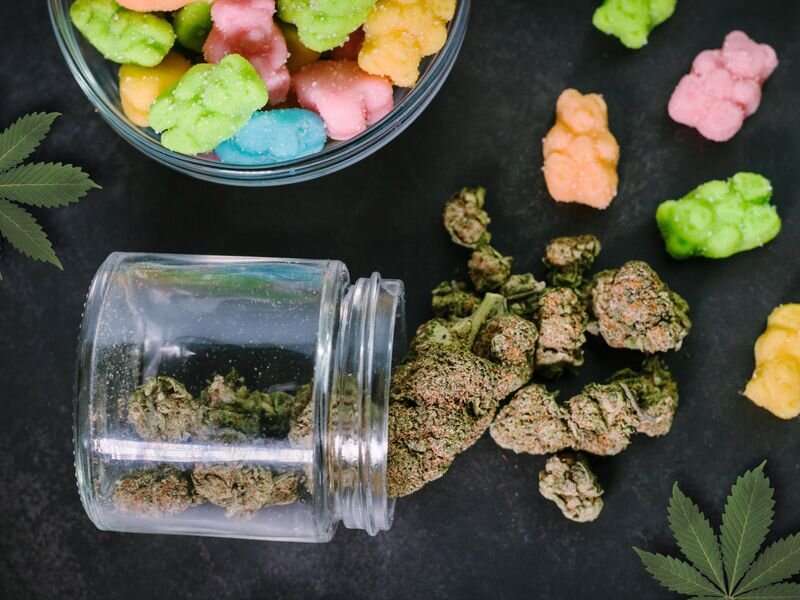Kids' poisonings rise as more parents bring pot edibles home

(HealthDay)—Edibles. In adults, they can be used recreationally or to help manage pain, nausea and anxiety. But these THC-loaded products, often sold as gummies, cookies and brownies, have fueled a four-year increase in the number of emergency calls for young children who mistakenly think they're yummy treats.
In 2021 alone, the New Jersey Poison Control Center assisted in the medical treatment of more than 150 children who ate cannabis edibles. Of these, nearly 100 were aged 5 or younger.
Nationally, there were 187 exposures to marijuana edibles among kids aged 12 and under in the United States in 2016, according to data from the American Association of Poison Control Centers. By 2020, that number had risen to more than 3,100—with a majority of the children aged 5 and under.
"Pediatric cannabis edible exposures are on the rise nationwide," said Dr. Diane Calello, executive and medical director of the New Jersey Poison Control Center at Rutgers New Jersey Medical School. "From 2019 to 2020, we observed a 370% increase in calls, and we received an all-time high of over 150 calls in 2021. So, it's clearly going up."
Another expert agreed the problem is worsening.
"We definitely have no shortage of children who get into parents' marijuana products. It's usually children 2 to 6 years old. It almost always involves edible products that are shaped like brownies or cookies or other things that children might reasonably think are good to eat," explained Dr. Eric Lavonas, toxicologist at the Rocky Mountain Poison and Drug Safety in Denver.
"The children will come in very altered and unable to communicate with their environment, often throwing up," he said. "The biggest danger is to make sure it isn't something else and that the child doesn't become dehydrated."
There are common misconceptions that you can't overdose on THC and any amount is safe to consume. But too much cannabis can result in unwanted physical and mental side effects ranging in severity. And when compared to smoking cannabis, the effects of edibles are often delayed, which can lead to unintentional overconsumption, posing a real danger to children.
A study in the journal Pediatrics last October compared the incidence of children accidentally consuming cannabis edibles prior to and after cannabis products were legalized in 17 states across the United States and in Canada in October 2018. The researchers discovered a significant increase in the incidences of children under age 11 accidentally consuming cannabis edibles and requiring emergency medical attention during the post-legalization period.
Interestingly, the researchers also found that although ER visit rates increased from pre- to post-legalization of cannabis, the rate of change remained the same between the two periods. This indicates the incidences of children accidentally consuming edibles has continued at a steady rate, suggesting this problem existed even before cannabis was legalized.
Even in states that haven't legalized cannabis, the authors noted increased access to medicinal or illicit forms is widespread, which may factor into the rising numbers of kids ingesting edibles.
"These products have become more accessible and available as the majority of states have access to legal medical and/or recreational marijuana," said Kaitlyn Brown, clinical managing director at the American Association of Poison Control Centers. "Edible cannabis products can be very appealing to children due to the appearance and taste of the product. There has been a large increase in cases since 2016."
Unfortunately, children, unlike adults who consume edibles, are at a significantly higher risk for severe side effects from cannabis. These health effects can include difficulty breathing, loss of coordination, drowsiness and seizures. Children may even need to be admitted to an intensive care unit in extreme cases.
For example, a toxicology research report, published in the Annals of Emergency Medicine in November 2017, describes a group of birthday party attendees who unintentionally ate THC gummies. Of the 21 people, 12 were children who had to go to the hospital.
"While potentially deadly effects are fortunately very rare, they are also preventable," Calello said. "A visit to the [ER] can be frightening for children and parents. So, safe storage and packaging of these products is a small way to prevent a potentially big problem."
The experts at Rutgers offer these tips to help keep edibles secure and away from children:
- Store edibles (or any cannabis products) the same way you would medication—in a secure/locked place out of sight and reach of children and pets.
- Pay close attention to edible potency (THC concentration).
- Limit the amount of edible products in the household at a given time.
- Only purchase products containing cannabis from licensed, reputable sources.
More information: Sheryl A. Ryan, Unintended but Hardly Unexpected Consequences of Cannabis Legalization, Pediatrics (2021). DOI: 10.1542/peds.2021-051426
Kathy T. Vo et al, Cannabis Intoxication Case Series: The Dangers of Edibles Containing Tetrahydrocannabinol, Annals of Emergency Medicine (2017). DOI: 10.1016/j.annemergmed.2017.09.008
Visit the U.S. National Institute on Drug Abuse for more on marijuana.
Copyright © 2021 HealthDay. All rights reserved.




















